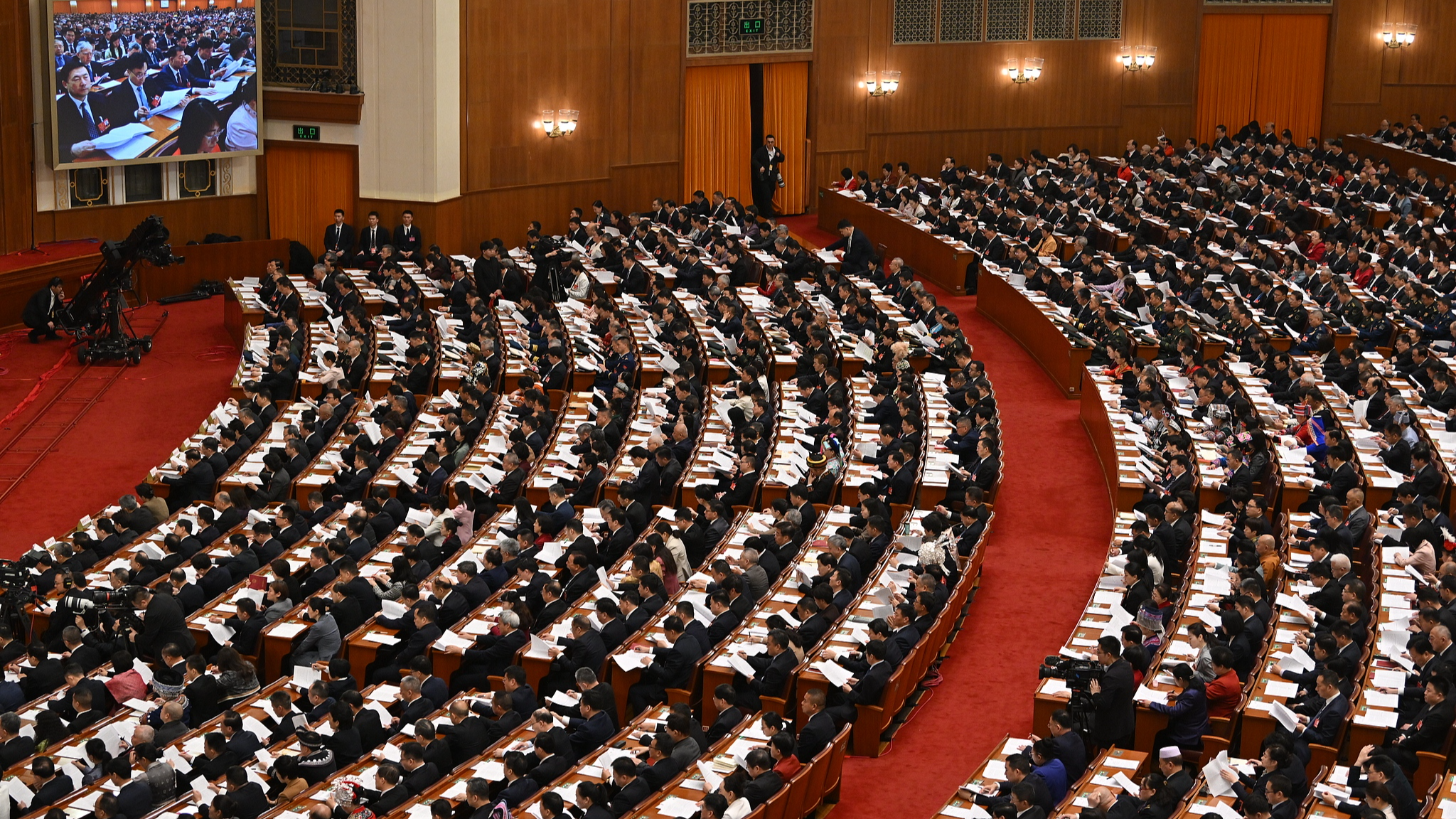
The third session of the 14th National People's Congress holds its second plenary meeting in Beijing, China, March 8, 2025. /VCG
The third session of the 14th National People's Congress holds its second plenary meeting in Beijing, China, March 8, 2025. /VCG
China's national lawmakers on Saturday began deliberating a work report from the Supreme People's Court (SPC).
SPC President Zhang Jun delivered the report at the second plenary meeting of the third session of the 14th National People's Congress.
According to the report, China took resolute actions against severe violent crimes last year.
In 2024, Chinese courts concluded 49,000 related cases, such as intentional homicide, a 5.8 percent decrease from the previous year. The number was also down 28.7 percent from 10 years ago.
Chinese courts also took strict and prompt action in accordance with the law when dealing with those who committed heinous crimes that challenged the bottom line of both legal and moral standards, the report said.
The report noted that last year, two mass murderers – Fan Weiqiu, convicted of causing heavy casualties after intentionally plowing his car into a crowd at a sports center in south China's Guangdong Province, and Xu Jiajin, convicted of killing eight people and injuring 17 in a knife attack at a vocational school in east China's Jiangsu Province – were sentenced to death.
It added that these punishments have deterred criminal offenders and protected the public.
The country also stepped up efforts to crack down on financial crimes in 2024 to safeguard financial security. Courts nationwide concluded 2.66 million financial cases last year, a 12.3 percent decrease year on year.
Of these cases, 25,000 were related to illegal fundraising and money laundering, a 5.3 percent increase year on year, according to the report.
**Stepping up oversight of profit-driven law enforcement**
China's courts have acted to protect the rights of businesses and entrepreneurs by stepping up oversight of illicit cross-region and profit-driven law enforcement, according to the report. It added that this was done to "strictly prevent the misuse of criminal measures in economic disputes."
Summarizing its work over the past year, the top court said this move was part of the judiciary's efforts to "create a law-based business environment."
"The legitimate rights and interests of both state-owned and private businesses were equally protected, while their illegal and criminal activities were severely punished by law," the report stated.
The report also noted that 46 cases involving property rights were retried and corrected by courts in 2024, with 13 out of 72 individuals involved in these cases being acquitted.
**Enhancing judicial efforts to punish corruption**
A total of 30,000 cases of duty-related crimes, such as bribery and embezzlement, were concluded by courts nationwide in 2024, marking an increase of 22.3 percent from the previous year, according to the report.
Chinese courts punished both those who took bribes and those who offered them, concluding 2,473 cases involving bribery offenses, the report stated.
The report also highlighted a series of corruption cases involving high-ranking sports officials, including Li Tie, former head coach of the national men's football team, who received a 20-year sentence.
**Equal protection of foreign parties' rights**
An increasing number of foreign individuals are choosing Chinese courts to exercise jurisdiction, as the country has strengthened its efforts to equally protect the rights of parties both domestically and abroad, according to the work report.
A number of significant corporate cases involving foreign investment have been concluded in accordance with the Foreign Investment Law, reinforcing China's position as one of the world's most attractive destinations for investment, the report stated.
Since 2013, Chinese courts have concluded about 417,000 first-instance civil and commercial cases involving foreign elements, representing parties from more than 100 countries and regions, the report added.
**First decline in the number of credit defaulters in 10 years**
The number of credit defaulters on China's blacklist experienced its first decline in a decade last year, according to the report. Nearly 2.46 million defaulters were added to the blacklist in 2024, a decrease of 23.4 percent year on year.
Over 2.82 million defaulters were reinstated to the market through a credit repair system in 2024, up 35.4 percent from the previous year, the report noted.
The decline in the number of defaulters reflects improved public awareness of the rule of law and integrity, as well as enhancements in law enforcement and the judicial environment, according to the report.
China established a blacklist of credit defaulters in 2013 to help maintain market order and social fairness.
**Enhancing judicial protection of IPRs**
China has strengthened judicial protection of intellectual property rights (IPRs) to support the country's key technologies and industries in the past year.
According to the report, China increased IPR protection in fields such as next-generation information technology, high-end manufacturing, biomedicine and new materials in 2024.
In the past year, the SPC effectively handled IPR disputes related to artificial intelligence, supporting the lawful application of AI and penalizing infringement using the technology.
Chinese courts at all levels concluded 494,000 cases related to IPRs in 2024, marking a 0.9 percent increase year on year, the report said.
(With input from Xinhua)